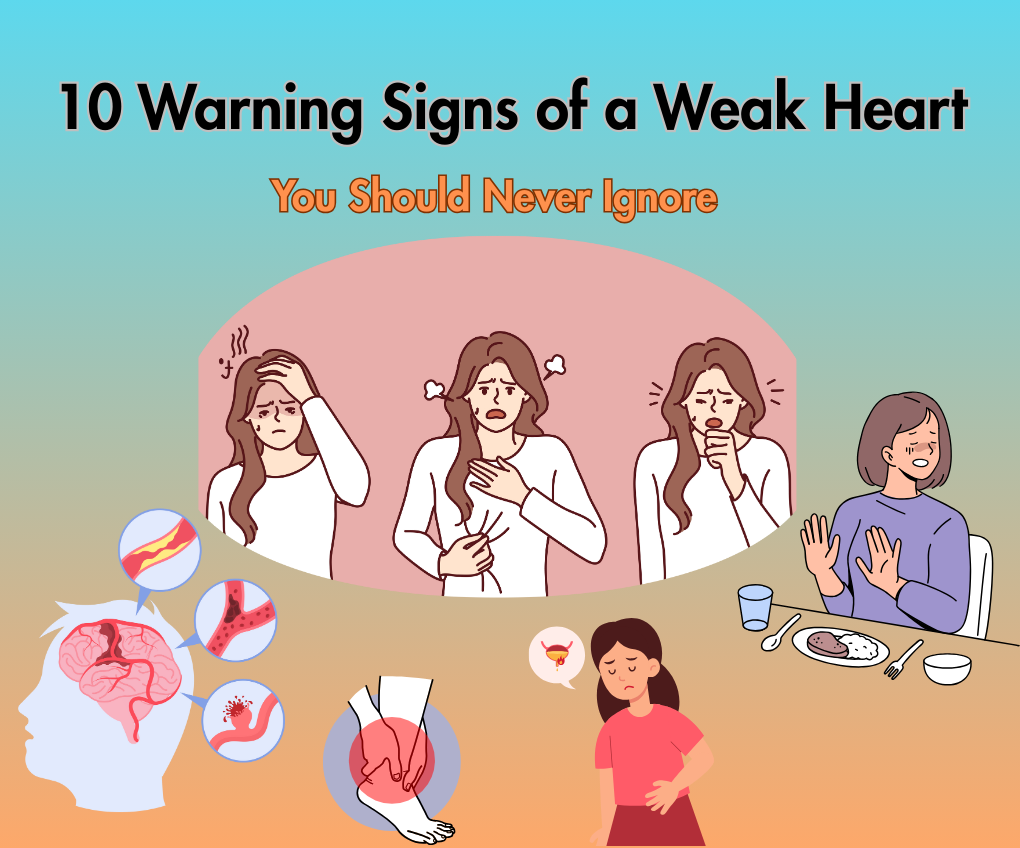“Weak heart” is commonly used to refer to a heart that has a reduced capacity for effective blood pumping. Although it may sound alarming, being aware of weak heart symptoms can give you the power to take early action. This blog post will discuss the meaning of a weak heart, the 10 symptoms that most frequently occur, the appropriate times to consult a physician, the methods used to diagnose it, and the available treatment options. We will also discuss early signs of heart failure, warning signs related to cardiac health, and important factors that can lead to a weak heart.
When you get to know weak heart symptoms, you can identify heart health warning signs and pursue prompt medical care. Identifying the condition at an early stage not only enhances outcomes but also paves the way for therapies that can bolster your heart muscle, ease symptoms, and improve life quality.
What Does a “Weak Heart” Mean?
A “weak heart” generally represents a decrease in the heart’s pumping efficiency, which is measured as a low ejection fraction (EF) on an echocardiogram. A normal EF is between 50 and 70%; values under 40% signify a diminished pumping capacity. Heart failure is generally considered to have two types:
- In systolic dysfunction, the heart’s muscle weakens, reducing the force of each contraction and causing less blood to be ejected with every pump, reflected by a decreased ejection fraction.
- Diastolic dysfunction: The heart fails to relax adequately between beats, which restricts its capacity to fill with blood (preserved EF).
Weak Heart Causes
Understanding the root of weak heart function aids in recognizing and providing medical treatment. A weak heart can occur due to many factors, including:
- Coronary artery disease (arteries that have narrowed, resulting in reduced oxygen supply to the heart muscle)
- High blood pressure (which adds to the heart’s workload over time)
- Cardiomyopathy (conditions affecting the heart muscle)
- Heart valve disease (valves that are leaky or constricted)
- Long-term alcohol misuse and specific infections or poisons
- Hereditary dispositions and chronic arrhythmias
10 Common Symptoms of a Weak Heart
It can save lives to identify symptoms of a weak heart early on. The ten most frequent indicators to look out for are as follows:
- Shortness of Breath When fluid accumulates in the lungs, it leads to difficulty in breathing, even with slight exertion or while at rest.
- Ongoing Coughing or Wheezing If a cough generates mucus that is pink or white, this could indicate that fluid is building up in the lungs.
- Exhaustion: When the heart is weakened, it cannot fulfill the body’s need for oxygen, leading to chronic fatigue, particularly during routine activities.
- Swelling of the Legs, Ankles, or Abdomen (Edema): Poor blood circulation leads to fluid leakage into nearby tissues, resulting in swelling of the lower limbs or abdomen.
- Fast or Erratic Heartbeat (Palpitations): The heart might race or skip beats in its effort to keep circulation sufficient.
- Diminished Ability to Work Out: A decrease in exercise tolerance, like becoming breathless while climbing stairs, frequently comes before more obvious symptoms.
- Nighttime Urination Requirement: When lying down, fluid that has been retained throughout the day may re-enter circulation, leading to frequent urination at night.
- Difficulty Focusing or Impaired Cognition: A decrease in cerebral blood flow may lead to confusion or memory issues.
- Chest Pain or Discomfort While chest tightness is more often associated with coronary artery disease, it can also occur during heart failure exacerbations.
- Loss of Appetite and Nausea A buildup of substances in the liver and digestive tract can cause a sensation of bloating, nausea, or decreased appetite.
Although these indicators of heart health issues may coincide with other conditions, the presence of several symptoms at once, particularly in individuals with risk factors, should prompt consideration of a heart assessment.
When to See a Doctor About These Symptoms
Symptoms, even when they begin subtly, must not be overlooked. If you notice the following, consult a doctor:
- Ongoing difficulty breathing, especially when lying down
- Swollen legs, ankles, or abdomen that doesn’t get better with resting
- Weight gain that occurs quickly (exceeding 2–3 lbs. over 1–2 days), suggestive of fluid retention
- Ongoing chest pain that lasts for several minutes or spreads to the arm or jaw
- Dizziness, feeling lightheaded, or experiencing fainting spells
- A cough producing pink, frothy mucus
If you have a history of heart disease, diabetes, hypertension, or cardiomyopathy in your family, it can raise your chances of developing heart failure. Heart dysfunction can be detected before severe complications arise through early evaluation, which includes a physical exam, blood tests, and imaging.
How a Weak Heart is Diagnosed
To diagnose a weak heart, clinicians use both clinical evaluations and diagnostic tests:
- During the physical exam and medical history review, your physician will evaluate your symptoms, past health conditions, current medications, and lifestyle habits. They’ll listen to your lungs for fluid buildup, look for swelling in your legs or ankles, and check your heartbeat for any irregularities.
- Blood Analyses: Comprehensive metabolic panel evaluating kidney and liver performance, electrolytes, and glucose levels. Complete blood count (CBC).
Imagine Research like
- Echocardiogram: to understand the functionality of the valves and irregularities in wall motion. Chest X-ray to identify cardiac enlargement and pulmonary congestion.
- Cardiac MRI: to know the myocardium and hemodynamic configurations.
- An electrocardiogram (ECG) captures electrical activity to detect arrhythmias, ischemia, or previous heart attacks.
- Stress testing evaluates the tolerance for exercise and reveals coronary artery disease as a possible reason for heart weakness.
- Cardiac Catheterization: Invasive examination of coronary arteries, intracardiac pressures, and blood flow patterns.
- The combined results of these tests assist in categorizing heart failure severity, pinpointing root causes of weak heart conditions, and directing treatment approaches.
Can a Weak Heart Be Treated?
Fortunately, most causes of a weak heart can be managed. The goal of treatment is to:
- Symptom alleviation
- Enhance cardiac performance
- Prevent the advancement of disease
- Lower the number of hospital admissions
- Improve quality of life
Some of the key changes one should adopt are
- Changes in Lifestyle Alterations to Diet: Reduce sodium consumption, restrict alcohol and caffeine consumption, and quit smoking. Focus on eating plenty of fresh produce, whole grains, and healthy proteins like fish, poultry, or legumes to support overall well-being.
- Consistent physical activity: Indulge in moderate exercises, such as walking or biking, to manage your weight under the supervision of a doctor to fortify the heart muscle.
- Pharmaceuticals: Medications like ACE inhibitors or ARBs, beta-blockers, diuretics, and mineralocorticoid receptor antagonists like Aldactone (spironolactone) and Inspra (eplerenone) have demonstrated advantages in heart failure.
- Instruments and methods like implantable cardioverter-defibrillator (ICD), cardiac resynchronization therapy, coronary revascularization (either angioplasty or bypass surgery), repairing or replacing the valve, or even performing a heart transplant are advisable.
Conclusion:
Identifying weak heart symptoms at an early stage can significantly alter the progression of heart failure. Whether it’s mild breathlessness and fatigue or more obvious symptoms like swelling and weight gain, looking for heart health warning signs and the causes of a weak heart can lead to timely medical intervention.
If you observe any of the common symptoms described above, arrange for a checkup. Effective treatments can be initiated, and with the help of advanced therapies, many individuals with heart weakness lead active and fulfilling lives.
Keep your heart healthy by staying informed, tuning in to your body’s signals, and collaborating with your healthcare provider.
FAQs
Can a weak heart get stronger again?
Yes. A heart that has weakened can often recover its strength and functionality, leading to symptom relief and enhanced quality of life, with the right treatment, such as medications, lifestyle modifications (diet, exercise, quitting smoking), and in certain instances, surgery or devices.
How does a weak heart feel?
A weak heart can manifest as ongoing tiredness and breathlessness, even with light exertion, as well as a feeling of heaviness or tightness in the chest, regular heart flutters, and swelling in the legs or stomach. Dizziness, lightheadedness, or a pervasive fatigue that rest does not alleviate may also be experienced.
Is having a weak heart the same thing as heart failure?
Not exactly—“weak heart” is a non-medical term referring to a diminished pumping ability, whereas heart failure is the clinical syndrome diagnosed when this weakness results in symptoms (such as fluid accumulation, tiredness, and shortness of breath) and observable declines in ejection fraction or diastolic function.
What are the earliest signs of a weak heart?
Initial indicators of heart weakness include minor tiredness or fatigue in everyday tasks, mild breathlessness when going up stairs or walking uphill, reduced exercise tolerance, intermittent swelling of the foot or ankle, increased nighttime urination (nocturia)
Can stress cause a weak heart?
Yes. Acute stress can induce physical symptoms associated with a “weak heart,” such as a racing heart, chest tightness, and fatigue, by increasing heart rate and blood pressure. Over time, chronic stress can lead to heart muscle damage and may even result in stress-induced cardiomyopathy (known as “broken heart syndrome”), which weakens the heart temporarily.
Do men and women experience weak heart symptoms differently?
Yes, Symptoms can differ between men and women. Men frequently describe “classic” cardiac symptoms, including chest pain or tightness, difficulty breathing, and discomfort in the left arm or jaw. Women are more prone to experience symptoms that are “atypical” or vague, such as ongoing exhaustion, nausea or digestive issues, discomfort in the back or shoulders, and light-headedness.
What food should I avoid if I have a weak heart?
It is advisable to steer clear of foods with a high salt content, Saturated and trans fats.
Added sugars in excess, alcohol consumption at an excessive level, and meat products with a high level of processing. Reducing these can assist in minimizing fluid retention, decreasing blood pressure, and alleviating the burden on your heart.
Can dehydration make heart symptoms worse?
Yes. Your blood volume decreases due to dehydration, which makes your heart exert more effort to circulate blood; this can exacerbate fatigue, lightheadedness, and low blood pressure in individuals with weak hearts.
Can lifestyle changes improve weak heart symptoms?
Yes. Changes in lifestyle—such as adhering to a low-sodium, heart-healthy diet; engaging in regular exercise (as tolerated); keeping to a healthy weight; giving up smoking; reducing alcohol consumption and stress management can all enhance heart function.
References:
- Your Heart's Early Warning System: 10 Signs And Risk Factors That Can Weaken
- Your Heart Later | TheHealthSite.com
- 11 Possible Heart Symptoms You Shouldn’t Ignore
For more informative blogs, click here


